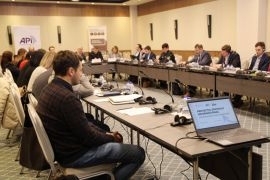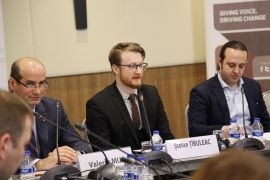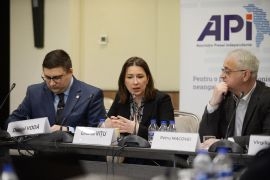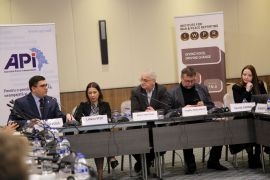back
Communication and Early Engagement Can Prevent and Combat Information Security Risks
Photo: API
"Protection of Information Space: Countering New Threats" was the theme of a debate with the participation of representatives of parliamentary standing committees, the audiovisual regulatory authority, public institutions, security experts, journalists and activists. The debate focused on the need to strengthen social cohesion and to increase the culture of education in the field of security for a better understanding by citizens of this vital issue for the existence of the state. The event was organized on 11 April 2023 by the Association of Independent Press (API) in partnership with the international organization Institute for War and Peace Reporting (IWPR).
At the event’s opening session, Petru Macovei, Executive Director of API, noted that since last autumn, when the first debate on this topic took place, and until now, the threats and challenges to security had remained the same, and some had even increased. "In this debate we want to assess what the response of the authorities and society as a whole has been to these threats and in which direction we should move forward."
The Chairman of the Parliamentary Committee on National Security, Defense and Public Order Lilian Carp stressed the importance and actuality of protecting information space in the context of the challenges of Russia’s military aggression against Ukraine. "The more we speak out in the public space and propose solutions to counter information attacks, the more prepared we will be when they come directly to us. The state actions must respect the right to free expression but also effectively combat propaganda and disinformation," the Committee Chairman said.
The first session, moderated by the journalist Madalin Necsutu, reviewed the main challenges to national security and analyzed the authorities' actions to counter them. A brief presentation on this topic was given by Stefan Tibuleac, Head of the Supreme Security Council Service at the Presidency of the Republic of Moldova. He also referred to the National Security Strategy currently being developed. "The context we are in is a complex one, marked by a wave of crises, and the authorities are making efforts to intervene to alleviate them, one example being the management of the refugee crisis. Today it is necessary to adapt actions to the type of challenges we are facing and the National Security Strategy, approved in 2011, is no more relevant to the current situation and threats," S. Tibuleac said. He referred to the main security threats, including Russia's geopolitical and military expansion, demographic decline, kleptocracy and endemic corruption, etc. For his part, Valeriu Mija, Secretary of State for Defense Policy, National Defense Planning and Military Interoperability at the Ministry of Defense, spoke about the changing international security paradigm in the Black Sea area after 24 February 2022, noting that “the Ministry of Defense has increased the level of military training, monitors the security zone, the eastern districts and, in general, military actions in these regions, as well as, the areas of interest Odessa and Nikolaev. For the Republic of Moldova, the most pronounced vulnerability at present is the airspace."
Speaking about the preparedness of the public institutions and society as a whole to deal with threats, Elena Marzac, Security Expert and StratCom co-founder of the Civil Society Platform for Security and Defense Initiatives, recalled that in recent years, civil society had insisted on ensuring transparency and effective communication of public institutions in the field of security: "In their efforts to manage crises, institutions must also take into account internal risks: political and territorial separatism, hostile efforts on ethnic and linguistic grounds, the phenomenon of disinformation."
The second part of the debate was entirely devoted to the protection of the country's information space. Virgiliu Paslariuc, Vice-Chair of the Parliamentary Committee on Culture, Education, Research, Youth, Sport and Media, spoke about the latest legislative initiatives in this regard, noting that both institutions and citizens had recently become much more responsible in reporting fakes disseminated in the public space.
The President of the Audiovisual Council (AC) Liliana Vitu spoke about how the recent amendments to the Audiovisual Media Services Code had influenced the quality of information broadcast by TV: "We notice a greater self-regulation by TVs regarding the content of programs broadcast and a decrease in the number of petitions from citizens and NGOs. In 2022, we focused on monitoring war coverage, and a methodology is now being finalized with indicators that will be tracked to determine whether or not certain content constitutes disinformation."
Daniel Voda, spokesman of the Prime Minister of the Republic of Moldova, reported on how resilient public institutions were in terms of communication in relation to the multitude of security threats, including information ones. He gave assurances that institutions were now much better prepared to combat disinformation. "I am an advocate of transparent, open communication in the interest of the citizen, which I always try to apply and recommend to all my colleagues in the communication departments of the public institutions and not only," D. Voda said.
At the debate, the representatives of the Coordinating Council for Information Security Assurance, referred to the implementation of information and cyber security assurance policies as well as to some new bills, such as the new draft law on the Intelligence and Security Service or the initiative to create a Strategic Communication Centre in our country. Sanda Sandu, chair of the civic-private sector, stressed: “Within the civic-private sector, we will also work on proposals for mechanisms to involve civil society in drafting, monitoring and evaluating information security policies," while Valeriu Pasa, chair of the media sector, highlighted some of the progress made in strengthening information security: "We are just at the beginning of the path. I think the next important step is creation of a Strategic Communication Centre, an institution that will have important tasks in supervising the online information space."
Media experts Ion Bunduchi, Executive Director of the Electronic Press Association (APEL), and Viorica Zaharia, President of the Press Council, spoke about the impact of disinformation campaigns. "The biggest success of the past year is that we have greatly covered the phenomenon of disinformation, and now we have to strengthen our efforts to combat it," I. Bunduchi said. "I believe that citizens of all ages should be involved in media education activities and this objective should be reflected in the new information security strategy," V. Zaharia added.
Other security experts, journalists and activists participated in the debates and expressed their opinions and asked questions.
The event was part of IWPR’s regional project “Amplify, Verify, Engage: Information for Democratization and Good Governance in Eurasia (AVE)”, which promotes democratic growth, participatory governance, and cross-border cooperation by strengthening civil society and independent media across Central Asia, Eastern Europe, and the Caucasus. The project is funded by the Ministry of Foreign Affairs of Norway.







